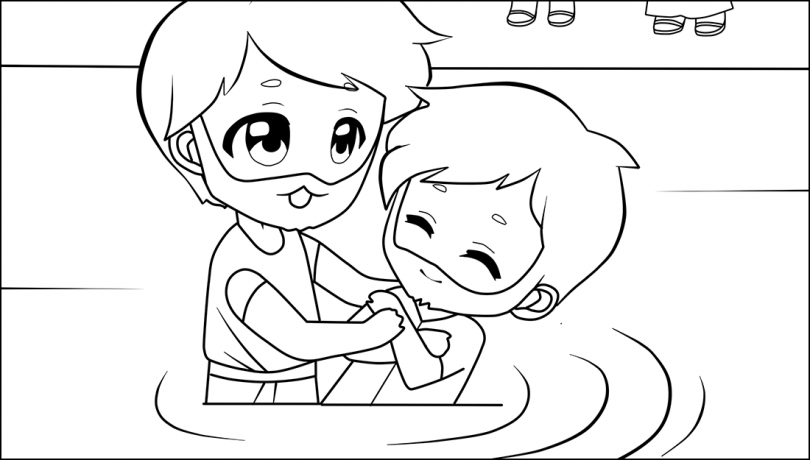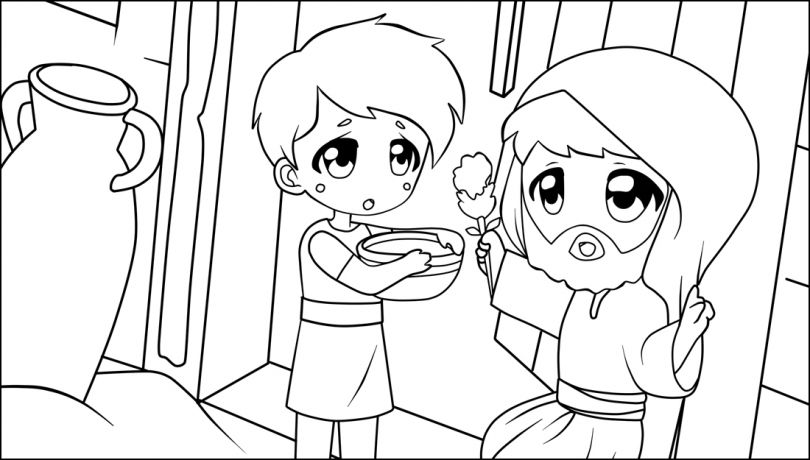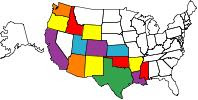Sanitary Laws and Quarantine from the Bible.
“There are things that Moses wrote about that science didn’t learn about until thousands of years later.
The biblical laws of sanitation were clearly ahead of their time! There was really no way to fully understand the reasons for these laws until the invention of the microscope, the discovery of bacteria and the pioneering work of pathologists in recent centuries, yet these ancient biblical laws have proven scientifically valid today! People who touched a dead or diseased animal or person—or even garments or secretions from a sick person—were to bathe and wash their clothes and avoid contact with others. Contaminated garments were to be washed or burned—important sanitizing principles that are still followed today.
Dwellings that showed signs of mold, or that had harbored sick individuals, were to be cleaned, repaired or destroyed, to prevent the spread of disease (see Leviticus 13–15). Porous vessels that came into contact with dead animals were to be broken, since they would harbor bacteria. People showing signs of sickness were to be isolated—quarantined—until examined by a priest and declared well. People were to wash after having sex. Tattoos and cuttings on the flesh were also forbidden (Leviticus 19:28), for reasons that include the risk of contracting disease. Modern physicians warn that tattoos and body-piercing carry a risk for contracting infectious diseases like hepatitis B, hepatitis C, syphilis and HIV/AIDS (International Journal of Infectious Disease, 2001, 5(1), 27–34).
In Deuteronomy 23:9–14, we learn that human wastes were to be buried, away from human dwellings. Today we call this sanitary waste disposal, and its benefits are widely understood but not always practiced—especially in poverty-stricken areas. History is filled with epidemics of typhus, cholera and dysentery, linked to the careless dumping of human waste into streets and rivers, or feeding human waste to animals that are then eaten. Burying human waste breaks the life cycle of many parasitic organisms that spread disease.
This simple practice is much more effective, and less expensive, than treating disease after it breaks out—and God put this principle in the Bible thousands of years before mankind's science understood its benefit!
While some scholars assert that the biblical laws were not given for reasons of health, this same commentary states that "the spiritual and hygienic reasons for the laws may still be affirmed. They are remarkably valuable in the area of public health… These laws protected Israel from bad diet, dangerous vermin and communicable diseases... These were rule-of-thumb laws that God gave in His wisdom to a people who could not know the reason for the provision" (ibid.). Thus, the idea that these biblical laws are outdated and old-fashioned and have nothing to do with health is simply nonsense!” Excepts from: https://www.tomorrowsworld.org/magazines/2004/march-april/bible-health-laws
_______
Leviticus 13 New King James Version (NKJV)
The Law Concerning Leprosy
“13 And the Lord spoke to Moses and Aaron, saying: 2 “When a man has on the skin of his body a swelling, a scab, or a bright spot, and it becomes on the skin of his body like a [a]leprous sore, then he shall be brought to Aaron the priest or to one of his sons the priests. 3 The priest shall examine the sore on the skin of the body; and if the hair on the sore has turned white, and the sore appears to be deeper than the skin of his body, it is a leprous sore. Then the priest shall examine him, and pronounce him [b]unclean. 4 But if the bright spot is white on the skin of his body, and does not appear to be deeper than the skin, and its hair has not turned white, then the priest shall isolate the one who has the sore seven days. 5 And the priest shall examine him on the seventh day; and indeed if the sore appears to be as it was, and the sore has not spread on the skin, then the priest shall isolate him another seven days.
6 Then the priest shall examine him again on the seventh day; and indeed if the sore has faded, and the sore has not spread on the skin, then the priest shall pronounce him clean; it is only a scab, and he shall wash his clothes and be clean. 7 But if the scab should at all spread over the skin, after he has been seen by the priest for his cleansing, he shall be seen by the priest again. 8 And if the priest sees that the scab has indeed spread on the skin, then the priest shall pronounce him [c]unclean. It is leprosy.
9 “When the leprous sore is on a person, then he shall be brought to the priest. 10And the priest shall examine him; and indeed if the swelling on the skin is white, and it has turned the hair white, and there is a spot of raw flesh in the swelling, 11 it is an old leprosy on the skin of his body. The priest shall pronounce him [d]unclean, and shall not isolate him, for he is unclean.
12 “And if leprosy breaks out all over the skin, and the leprosy covers all the skin of the one who has the sore, from his head to his foot, wherever the priest looks, 13then the priest shall consider; and indeed if the leprosy has covered all his body, he shall pronounce him clean who has the sore. It has all turned white. He is clean. 14But when raw flesh appears on him, he shall be unclean. 15 And the priest shall examine the raw flesh and pronounce him to be unclean; for the raw flesh is unclean. It is leprosy. 16 Or if the raw flesh changes and turns white again, he shall come to the priest. 17 And the priest shall examine him; and indeed if the sore has turned white, then the priest shall pronounce him clean who has the sore. He is clean.
18 “If the body develops a boil in the skin, and it is healed, 19 and in the place of the boil there comes a white swelling or a bright spot, reddish-white, then it shall be shown to the priest; 20 and if, when the priest sees it, it indeed appears deeper than the skin, and its hair has turned white, the priest shall pronounce him unclean. It is a leprous sore which has broken out of the boil. 21 But if the priest examines it, and indeed there are no white hairs in it, and it is not deeper than the skin, but has faded, then the priest shall isolate him seven days; 22 and if it should at all spread over the skin, then the priest shall pronounce him unclean. It is a [e]leprous sore. 23 But if the bright spot stays in one place, and has not spread, it is the scar of the boil; and the priest shall pronounce him clean.
24 “Or if the body receives a burn on its skin by fire, and the raw flesh of the burn becomes a bright spot, reddish-white or white, 25 then the priest shall examine it; and indeed if the hair of the bright spot has turned white, and it appears deeper than the skin, it is leprosy broken out in the burn. Therefore the priest shall pronounce him unclean. It is a leprous sore. 26 But if the priest examines it, and indeed there are no white hairs in the bright spot, and it is not deeper than the skin, but has faded, then the priest shall isolate him seven days. 27 And the priest shall examine him on the seventh day. If it has at all spread over the skin, then the priest shall pronounce him unclean. It is a leprous sore. 28 But if the bright spot stays in one place, and has not spread on the skin, but has faded, it is a swelling from the burn. The priest shall pronounce him clean, for it is the scar from the burn.
29 “If a man or woman has a sore on the head or the beard, 30 then the priest shall examine the sore; and indeed if it appears deeper than the skin, and there is in it thin yellow hair, then the priest shall pronounce him unclean. It is a scaly leprosy of the head or beard. 31 But if the priest examines the scaly sore, and indeed it does not appear deeper than the skin, and there is no black hair in it, then the priest shall isolate the one who has the scale seven days. 32 And on the seventh day the priest shall examine the sore; and indeed if the scale has not spread, and there is no yellow hair in it, and the scale does not appear deeper than the skin, 33 he shall shave himself, but the scale he shall not shave. And the priest shall isolate the one who has the scale another seven days. 34 On the seventh day the priest shall examine the scale; and indeed if the scale has not spread over the skin, and does not appear deeper than the skin, then the priest shall pronounce him clean. He shall wash his clothes and be clean. 35 But if the scale should at all spread over the skin after his cleansing, 36 then the priest shall examine him; and indeed if the scale has spread over the skin, the priest need not seek for yellow hair. He is unclean. 37 But if the scale appears to be at a standstill, and there is black hair grown up in it, the scale has healed. He is clean, and the priest shall pronounce him clean.
38 “If a man or a woman has bright spots on the skin of the body, specifically white bright spots, 39 then the priest shall look; and indeed if the bright spots on the skin of the body are dull white, it is a white spot that grows on the skin. He is clean.
40 “As for the man whose hair has fallen from his head, he is bald, but he is clean. 41He whose hair has fallen from his forehead, he is bald on the forehead, but he is clean. 42 And if there is on the bald head or bald forehead a reddish-white sore, it is leprosy breaking out on his bald head or his bald forehead. 43 Then the priest shall examine it; and indeed if the swelling of the sore is reddish-white on his bald head or on his bald forehead, as the appearance of leprosy on the skin of the body, 44 he is a leprous man. He is unclean. The priest shall surely pronounce him [f]unclean; his sore is on his head.
45 “Now the leper on whom the sore is, his clothes shall be torn and his head bare; and he shall cover his mustache, and cry, ‘Unclean! Unclean!’ 46 He shall be unclean. All the days he has the sore he shall be unclean. He is unclean, and he shall [g]dwell alone; his dwelling shall be outside the camp.
The Law Concerning Leprous Garments
47 “Also, if a garment has a [h]leprous plague in it, whether it is a woolen garment or a linen garment, 48 whether it is in the warp or woof of linen or wool, whether in leather or in anything made of leather, 49 and if the plague is greenish or reddish in the garment or in the leather, whether in the warp or in the woof, or in anything made of leather, it is a leprous [i]plague and shall be shown to the priest. 50 The priest shall examine the plague and isolate that which has the plague seven days. 51And he shall examine the plague on the seventh day. If the plague has spread in the garment, either in the warp or in the woof, in the leather or in anything made of leather, the plague is an active leprosy. It is unclean. 52 He shall therefore burn that garment in which is the plague, whether warp or woof, in wool or in linen, or anything of leather, for it is an active leprosy; the garment shall be burned in the fire.
53 “But if the priest examines it, and indeed the plague has not spread in the garment, either in the warp or in the woof, or in anything made of leather, 54 then the priest shall command that they wash the thing in which is the plague; and he shall isolate it another seven days. 55 Then the priest shall examine the plague after it has been washed; and indeed if the plague has not changed its color, though the plague has not spread, it is unclean, and you shall burn it in the fire; it continues eating away, whether the damage is outside or inside. 56 If the priest examines it, and indeed the plague has faded after washing it, then he shall tear it out of the garment, whether out of the warp or out of the woof, or out of the leather. 57 But if it appears again in the garment, either in the warp or in the woof, or in anything made of leather, it is a spreading plague; you shall burn with fire that in which is the plague. 58 And if you wash the garment, either warp or woof, or whatever is made of leather, if the plague has disappeared from it, then it shall be washed a second time, and shall be clean.
59 “This is the law of the leprous plague in a garment of wool or linen, either in the warp or woof, or in anything made of leather, to pronounce it clean or to pronounce it unclean.” From: https://www.biblegateway.com/passage/?search=Leviticus+13&version=NKJV;NIV
________
Why Should Christians Celebrate the Passover?
“Jesus Christ and the apostles kept the Passover. What does Passover mean for Christians today?
 Photos.com
Photos.com
Christians who observe this annual memorial marking Jesus’ death are reminded that eternal life is possible only through Jesus Christ.
The first of God’s seven annual festivals is the Passover (Leviticus 23:5). Passover falls in early spring in the Holy Land and is a reminder of how God spared His people from death in Egypt. To rescue His people from slavery, God took the lives of all the firstborn Egyptian males (Exodus 12:7, 26-29) but passed over the Israelites’ homes that had the blood of a sacrificed lamb on their door frames.
The blood of the Passover lamb foreshadowed the sacrifice of Jesus Christ, which passes over the sins of people who repent in order to spare them from eternal death. The New Testament makes clear that Christ is the true Passover Lamb (compare Exodus 12:21 with 1 Corinthians 5:7). In observing His last Passover with His disciples, Jesus explained that the symbols of bread and wine represent His body and blood, offered by Him for the forgiveness (or passing over) of our sins and the death penalty our sins have earned for us (Matthew 26:26-28; Mark 14:22-24).
The death of Christ actually took place during the daylight hours that followed the Passover evening—which was still the same date according to Hebrew sunset-to-sunset reckoning. Christ was sacrificed on Passover.
The New Testament Passover is a memorial of the suffering and death of Jesus Christ. This is also when baptized members of the United Church of God renew our agreement to come under the blood of Jesus Christ, the perfect Passover Lamb, for the forgiveness of our sins. We approach this period of the year with deep spiritual introspection. We commemorate the Passover on the 14th day of the first month of the sacred year with a service based on the instructions of 1 Corinthians 11:23-28 and the Gospel accounts of the New Testament Passover that Christ instituted.
This solemn service begins with a brief explanation of its purpose, followed by foot-washing (based on Christ’s example and instructions in John 13). Then the minister gives an explanation of the symbols of the Passover, unleavened bread and wine, which represent the body and blood of our Savior. Each baptized member of the Church eats a small piece of the unleavened bread and drinks a small glass of the wine (Mark 14:22-24).
Christians who observe this annual memorial marking Jesus’ death (1 Corinthians 11:26) are reminded that eternal life is possible only through Him (John 6:47-54; Acts 4:10-12). Jesus’ sacrifice is the starting point for salvation and the foundation of the annual feast days that follow. The next one is the Feast of Unleavened Bread.” From: https://www.ucg.org/bible-study-tools/bible-questions-and-answers/why-should-christians-celebrate-the-passover
______
Update
Just like most places, not much going on here. No Bible studies, no church, except online. A quick trip to the Post Office to mail a package, and to the grocery store to buy fresh salad and veggies. Everybody ‘distanced’ and there were 6’ spaces marked out on the floor at the registers.
But I got a cat! While I was in the store a lady was buying several enormous bags of dog food. I commented that she must have a lot of dogs, and she said she was a rescue. I said well, "All I want is an old cat", and she said "I have one".
The cat’s human died and the cat was left in the house for ages before they found him. They thought he was dead, but revived him. He is still skinny and his hair coat isn't what it should be, but now he is here, safe in my apartment.
He probably has Upper Respiratory Infection because he was with a lot of other cats at the rescue and he sometimes coughs with a little sneeze, but with good care he should get better in a couple of weeks. He is a very loving and well-behaved Siamese.
On the Sabbath, I watched sermons online, and it was a quiet and enjoyable day






 Like this one:
Like this one:












